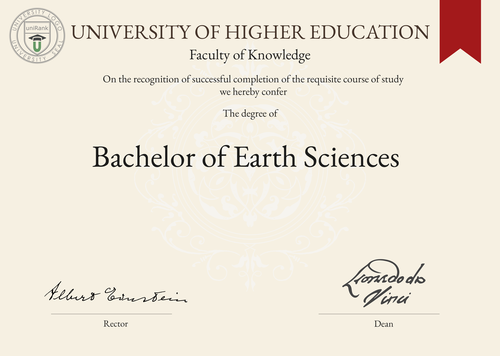
Bachelor of Earth Sciences (BES)
Guide to University Programs/Courses
Bachelor of Earth Sciences (BES)

Program/Course Name
Bachelor of Earth SciencesProgram/Course Abbreviation
BESDuration Range
The duration of the Bachelor of Earth Sciences program typically ranges from 3 to 4 years.Tuition range
The tuition fees for the Bachelor of Earth Sciences program can vary depending on the country and university chosen. It is recommended to check with specific institutions for accurate information.Overview
The Bachelor of Earth Sciences program is designed to provide students with a comprehensive understanding of the Earth's systems, including geology, meteorology, oceanography and environmental science. Students will gain knowledge and skills in analyzing geological processes, studying natural resources and understanding the impact of human activities on the environment.Curriculum Overview by Year
- Year 1: Introduction to Earth Sciences, Mathematics for Earth Sciences, Chemistry for Earth Sciences, Introduction to Geology- Year 2: Mineralogy and Petrology, Sedimentology, Structural Geology, Geophysics- Year 3: Geochemistry, Paleontology, Environmental Geology, Fieldwork- Year 4: Geotechnical Engineering, Hydrogeology, Climate Change, Research ProjectKey Components
The key components of the Bachelor of Earth Sciences program include studying the Earth's physical and chemical processes, analyzing geological data, conducting fieldwork and laboratory experiments and developing skills in data interpretation and scientific research.Career Prospects
Graduates of the Bachelor of Earth Sciences program can pursue various career paths, including roles in environmental consulting firms, government agencies, mining and energy industries, research institutions and educational organizations. Potential job titles include geologist, environmental scientist, hydrologist, geotechnical engineer and natural resource manager.Salary Expectations
Salary expectations for graduates of the Bachelor of Earth Sciences program can vary depending on factors such as job location, industry and level of experience. Entry-level positions may have a salary range of $40,000 to $60,000 per year, while experienced professionals can earn salaries upwards of $100,000 per year. For a more accurate understanding of salary expectations, you can utilize the Job Sites Search Engine, from our sister site jobRank, which searches over 4,600 job sites worldwide. Make sure to specify not only the job title but also the country you are interested in.Conclusions
It is important to note that the duration, tuition fees, curriculum, key components, career prospects and salary expectations of the Bachelor of Earth Sciences program can vary depending on the country or location where the program is studied, as well as the chosen university. Prospective students are advised to research and compare different institutions to find the best fit for their academic and career goals. Visitors can search for where the Bachelor of Earth Sciences degree is offered anywhere in the world through the uniRank World Universities Search Engine.World Universities Search Engine
search for Bachelor of Earth Sciences (BES) and add the Location (country, state etc.) or specific University you are interested in studying at.
Query examples:
- Bachelor of Earth Sciences (BES) United States
- Bachelor of Earth Sciences (BES) United Kingdom online
- Bachelor of Earth Sciences (BES) Australia international students
- Bachelor of Earth Sciences (BES) University of California
- Bachelor of Earth Sciences (BES) University of London tuition fees
- Bachelor of Earth Sciences (BES) University of Sydney scholarships